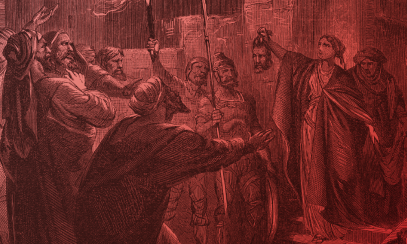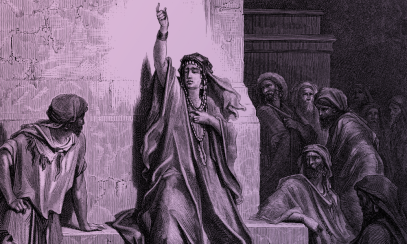Does Hell Exist and Does Anybody Go There?
The Church’s answer to these questions of hell is clear. The existence of hell and the possibility of condemnation to hell are real because we have been given the gift of free will. God will respect this free will because God is love – and love must be freely given and freely received in order to be love at all.
Sometimes, we hear an argument against the existence of hell that goes something like this: a loving God could never condemn anyone to hell so, in the end, everyone will be saved … even Satan himself.
Apoka-what?
Let’s go back a bit in Church history. This history refers to the doctrine of universal salvation as apokatástasis (or apocatastasis), which literally means a reconstitution or restoration to the original condition. The more common name for this is universalism, and it holds that all human souls will eventually be saved. (Some proponents even extend this salvation beyond humanity, to Satan.)
This belief is most often attributed, rightly or wrongly, to one of the major theologians of the early Church, Origen. Given that he lived from 185 to 254, we can see that this doctrine is not a new phenomenon. It was partially condemned in 544 by the patriarch of Constantinople and this condemnation was ratified in 553 by the Second Council of Constantinople, the fifth of the Church’s Ecumenical Councils.
The problem with universalism, like all heresy, is that it reduces the fullness of the truth to a partial truth. It affirms only the truth that Jesus Christ died for the sins of all, while passing over the truth that not everyone will accept this gift of grace. So while this teaching may be appealing and make us feel good, the truth is that there simply is no compelling basis for it in Scripture, Tradition or the teaching of the magisterium.
It’s only logical
Another way to discern the validity of the doctrine of universalism is to look at it from the point of view of logic. For example, a foundational principle for Aristotle’s metaphysics and philosophy is the law of non-contradiction. This law states that opposite truth claims cannot both be true.
In the case of universalism, we have the claim that a loving God cannot ultimately condemn anyone to hell precisely because such a thing would be unloving. At the same time, we have the claim that love both presupposes and demands that the one loved is free to receive or reject the offer of love, for a love imposed upon another is no love at all. So can both these claims be true?
Consider this…
In the Christian tradition, the existence of Satan and hell is often explained through an allegorical story of an angel, magnificent in a beauty unmatched in all the heavens. This angel over the ages eventually became known as Lucifer, Latin for “light-bearer.” The story goes on to weave a tale of pride giving birth to envy and ultimately rebellion as Lucifer attempted to usurp the God he could no longer tolerate as his creator. He was not able to see his own beauty granted to him by God. Instead, all he could see was that the light, which made him most among the angels and most truly himself, fell short in comparison to God.
The rebellion was an abysmal failure. Lucifer was expelled from heaven and was transformed into Satan, from the Hebrew word meaning “adversary.” From his location outside of heaven, Satan continues his war against God. Interestingly enough, this former bearer of light can no longer stand light of any kind. His world is one of darkness much like the vampires of the modern cinema that are not only repulsed by light, but find the end of their “immortality” in the light.
Will God’s love for Satan override Satan’s desire and choice for life apart from God? Is it loving to force someone into a life with God against his or her will? Ultimately, it comes down to free will. God loves all of us – and even Satan – enough to allow us to choose love or hell.
For Further Reflection
Consider prayerfully reading the following Scripture passage:
There was a rich man who dressed in purple garments and fine linen and dined sumptuously each day. And lying at his door was a poor man named Lazarus, covered with sores, who would gladly have eaten his fill of the scraps that fell from the rich man’s table. Dogs even used to come and lick his sores.
When the poor man died, he was carried away by angels to the bosom of Abraham. The rich man also died and was buried, and from the netherworld, where he was in torment, he raised his eyes and saw Abraham far off and Lazarus at his side. And he cried out, ‘Father Abraham, have pity on me. Send Lazarus to dip the tip of his finger in water and cool my tongue, for I am suffering torment in these flames.’ Abraham replied, ‘My child, remember that you received what was good during your lifetime while Lazarus likewise received what was bad; but now he is comforted here, whereas you are tormented. Moreover, between us and you a great chasm is established to prevent anyone from crossing who might wish to go from our side to yours or from your side to ours.’
He said, ‘Then I beg you, father, send him to my father’s house, for I have five brothers, so that he may warn them, lest they too come to this place of torment.’ But Abraham replied, ‘They have Moses and the prophets. Let them listen to them.’ He said, ‘Oh no, father Abraham, but if someone from the dead goes to them, they will repent.’ Then Abraham said, ‘If they will not listen to Moses and the prophets, neither will they be persuaded if someone should rise from the dead.’”
Luke 16:19-31
Reflection Questions:
1. Reflect for a few moments on this passage. The Church teaches that each of us will face judgment at the moment of our death. The state of our soul will determine whether we go to heaven, purgatory or hell. How does this parable of Jesus support or undermine this teaching?
2. What does this passage suggest about the finality of hell?
3. How might this passage help you discuss the reality of hell with someone who believes everyone will be saved in the end?



